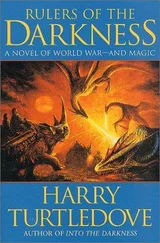He and Raunu and Gedominu got their sticks out from under the straw in the barn. The farmer looped a long coil of rope over his left shoulder and passed other coils to his comrades. “Let’s go have ourselves some fun,” he said, and chuckled. “Don’t suppose the Algarvians will like it so well, though.”
“Pox take ’em,” Raunu said, at which Skarnu and Gedominu nodded.
Once they got off Gedominu’s farm, the three men separated. Because he’d dwelt in these parts since the collapse of the Valmieran army, Skarnu had come to know the paths for several miles around the farm. Gedominu still knew them better, of course; to him, they were as familiar as the way upstairs in his own home. They weren’t to Skarnu, and never would be. But he could make his way along them without the farmer, even in the darkness.
As he knew Gedominu and Raunu were doing, he made for the woods. Despite the stick he carried, he felt more like hunted than hunter. If an Algarvian patrol caught sight of him, he intended to run first and fight only if he had to. That wasn’t heroic, but he hadn’t come out here to be a hero. He’d come to be a nuisance, a role with a different set of requirements.
When he found a couple of trees near the edge of the path, he nodded to himself. He tied one end of the rope to the trunk of one tree, then ran it across the road to the other. He tied it to that one, too, cut off the length of rope, and went on his way looking for another spot to set a trip line.
If he was lucky, an Algarvian horse or unicorn would break a leg and have to be put out of its misery. If he was luckier, an Algarvian might break his leg or, if Skarnu was luckier still, his neck. At best, it would be a pinprick against King Mezentio’s forces. If harassing the redheads was the best Skarnu could do right now, though, he would content himself with the knowledge that it was his best.
He chose where to place his trip lines with several different kinds of care. As many as possible went on land belonging to farmers friendly toward the Algarvians. If he got those farmers into trouble with the occupiers, so much the better: they wouldn’t stay friendly toward them for long. And if the Algarvians blamed men who really were well inclined toward them, they wouldn’t look so hard for people who weren’t.
After Skarnu used the last of the rope, he made his way back toward Gedominu’s farm. He was surprised at how confidently he moved in the dark. Once, not too far away, he heard some Algarvians on horseback. He slid off the path and into the bushes. The Algarvians hadn’t heard him. On routine patrol, they chattered among themselves. Their noise faded and finally vanished.
A lamp was still burning downstairs when Skarnu got back to the farm. He glanced that way, sighed, and opened the barn door so he could roll himself in his blanket there. He must have made some noise, for the door to the farmhouse opened, too. Merkela stood silhouetted against the light within. Softly, she called, “Who is it?”
“Me,” Skarnu answered, just loud enough to let her recognize his voice.
“You are the first one back,” she said. “Come inside and drink a cup of hot spiced ale, if you care to.”
“I thank you,” he said, and had all he could do not to run to her side. When she gave him the ale, he held the big mug in both hands, warming them against the earthenware. He sat at the table where he’d eaten supper, sipping slowly. The ale was good. Watching Merkela was better. He didn’t say anything. Had he said anything, the first words out of his mouth would have been too much.
In the dim light, her eyes were enormous. She kept watching him, too, and not saying anything. At last, she took a deep breath. “I think—” she began. The door opened. In came Gedominu, Raunu only a couple of paces behind him. “I think,” Merkela went on smoothly, “I will pour some more ale.” Whatever else she might have thought, she kept to herself. Likely just as well, Skarnu thought, and wished he could make himself believe it.
A few days later, two squads of Algarvian soldiers tramped up to the farm at first light. In fair Valmieran, the lieutenant leading them said. “We want the peasant Gedominu.” He read the name from a list.
“I am Gedominu,” the farmer said quietly. “Why do you want me?”
“As hostage,” the lieutenant answered. “A warrior of King Mezentio’s was killed by a trip line. We take ten for one, to keep this foolishness from happening more. You come.” His soldiers leveled their sticks at Gedominu. “If the one who did this does not yield, we kill you.”
Skarnu stepped forward. “Take me instead.” The words came out of his mouth before he quite knew they would.
“You are brave,” the Algarvian lieutenant said, and surprised him by sweeping off his hat and bowing from the waist. “But his name is on my paper. Your name is not. And so we take him. You and your wife”—his eyes lingered on Merkela, as any man’s might have; he did not know the mistake he was making—“can keep this farm going without two old men here. One will do.” He waved toward Raunu to show which old man he meant, then spoke to his men in their own language.
A couple of them seized Gedominu and hustled him away. The rest kept Skarnu and Raunu and Merkela so well covered that any try at rescuing the farmer would have been suicide. Off the redheads went, Gedominu limping along in their midst. Skarnu stared helplessly after them. They had the right man and didn’t even know it. They didn’t care, either. They would have been just as happy to blaze him had he been the wrong man.
* * *
Count Sabrino had never imagined he could enjoy victory so much. After Valmiera was vanquished, after Jelgava yielded, he’d been ordered back to Trapani. All the civilians there were sure the results of the Six Years’ War had been overthrown forever, and that peace would soon be at hand.
“How can Lagoas go on fighting us?” If Sabrino heard that once, he heard it a hundred times. “Derlavai is ours.”
Lagoan dragons still dropped eggs on southern Valmiera and Algarve. Lagoan warships still raided the coasts of Valmiera and Jelgava. It was still war, but it was war by fleabites. And Algarve could inflict no more than fleabites on Lagoas, either. Sabrino knew that, whether civilians did or not. He never tried to change their minds. Much of what he knew, he could not speak about. Even if he could have, he wouldn’t. Pretty women were much likelier to throw themselves at the feet of a man who had conquered than one in the process of conquering.
One of the things Sabrino knew was that crushing the Kaunian kingdoms did not mean Derlavai belonged to Algarve. He could read a map. So could a great many civilians, of course. But he did it habitually, as part of his duties. More and more these days, he found himself looking west.
Invitations to the royal palace frequently came his way. He would have been insulted had it been otherwise. Not only was he a noble, he was also an officer who had distinguished himself in three of Algarve’s four fights thus far. And so he would don his fanciest uniform tunic and kilt, put on every glittering decoration and badge of rank to which he was entitled, and swagger off to dance and drink and talk and display himself. He seldom came home alone.
He also went to the palace to listen to King Mezentio. Mezentio fascinated him, as the king fascinated most Algarvians. Unlike the vast majority of his countrymen, who could at most occasionally hear the king when he spoke by way of the crystal, Sabrino got to speak with him as well as listen. He took as much advantage of that as he could.
“It comes down to a matter of will,” Mezentio declared one chilly evening. He waved a goblet of hot brandy punch to emphasize his point. “Algarve refused to admit herself defeated after the Six Years’ War, and so, in the end, she was not defeated. She was split up, she was in part occupied, she was robbed—and she was forced to sign a treating declaring all this was good, all this was as it should have been. But defeated? Never! Not in her heart! Not in your hearts, my friends.” He gestured again, this time in scorn of anyone who could think otherwise.
Читать дальше












